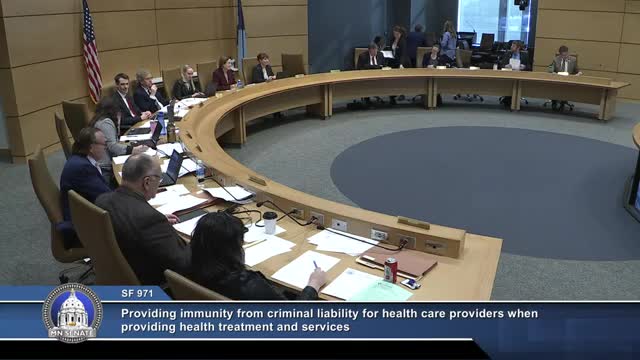Committee lays over bill seeking criminal immunity for healthcare providers in cases of honest mistakes amid sharp partisan debate
Get AI-powered insights, summaries, and transcripts
Subscribe
Summary
Senate File 971, which would limit criminal prosecution of healthcare providers for good-faith medical errors while preserving civil and licensing remedies, drew strong support from many nursing and hospital leaders and sharp opposition from others; the committee laid the bill over after heated debate and a proposed amendment.
Senate File 971, a bill that would limit criminal prosecution of health care providers for good‑faith medical errors while preserving civil and licensing remedies, drew extensive testimony both for and against and was laid over by the Senate Health and Human Services Committee on Feb. 18, 2025.
Sponsor Senator Mann said the bill is intended to protect clinicians from criminal prosecution for unintentional mistakes and to encourage transparent reporting and systems learning. “This bill does not prevent investigation. This bill does not prevent the removal of a medical license,” Mann said, adding that “an unintended error should not make someone a criminal.” He and supporters also emphasized the need to maintain workforce recruitment and retention.
Supporters included Adam Carlin, chief nursing officer at M Health Fairview Southdale and policy chair of the Minnesota Organization of Leaders in Nursing, who warned that criminal prosecution for errors chills reporting and undermines patient safety efforts. Kelly Hagen, a chief nursing officer at Rainy Lake Medical Center, said immunity for good-faith clinical errors would “support a culture of transparency and reporting” and help with workforce retention.
Opponents included Dr. Patrice Narad, who urged rejection of the bill, arguing it would “eliminate accountability” and could shield reckless or unethical conduct; Dr. Narad said the measure was too broad and risked eroding public trust. Several committee members expressed concern about the breadth of the bill and whether existing criminal statutes (including for intentional harm and assisted suicide) would remain enforceable.
Senator Lisky offered an A1 amendment to carve out conduct related to assisted suicide (citing statutory provisions that exclude certain acts from immunity). The amendment’s sponsor and other senators debated whether the carve-out was necessary because the bill’s existing language preserved criminal liability for “gross negligence or wanton willful, malicious, or intentional misconduct.” Counsel advised that the bill’s ‘‘notwithstanding’’ language and then the explicit carve-outs in paragraph B would need careful review to determine whether the assisted‑suicide carve‑out was already covered. Several members said they were not ready to vote and urged further drafting and review.
Given the unresolved legal questions and the intensity of the debate, members agreed to lay SF 971 over to allow additional discussion and potential revisions; the committee record lists the measure as laid over on Feb. 18, 2025.
Testimony repeatedly emphasized that the bill would not change civil liability or board/licensure processes. Sponsor and supporting witnesses cited the 2022 Tennessee case of a nurse convicted for a fatal medication error as motivating the proposal; opponents countered that the danger of removing criminal accountability outweighed any gains in reporting.
The committee laid the bill over to permit further review and stakeholder discussions in advance of possible future action.
